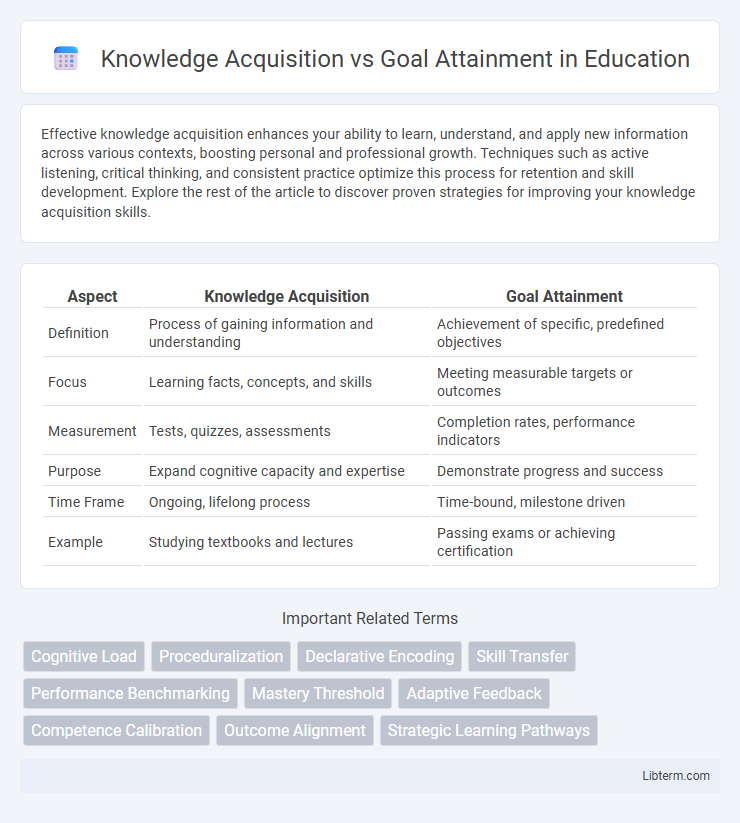Effective knowledge acquisition enhances your ability to learn, understand, and apply new information across various contexts, boosting personal and professional growth. Techniques such as active listening, critical thinking, and consistent practice optimize this process for retention and skill development. Explore the rest of the article to discover proven strategies for improving your knowledge acquisition skills.
Table of Comparison
| Aspect | Knowledge Acquisition | Goal Attainment |
|---|---|---|
| Definition | Process of gaining information and understanding | Achievement of specific, predefined objectives |
| Focus | Learning facts, concepts, and skills | Meeting measurable targets or outcomes |
| Measurement | Tests, quizzes, assessments | Completion rates, performance indicators |
| Purpose | Expand cognitive capacity and expertise | Demonstrate progress and success |
| Time Frame | Ongoing, lifelong process | Time-bound, milestone driven |
| Example | Studying textbooks and lectures | Passing exams or achieving certification |
Understanding Knowledge Acquisition
Knowledge Acquisition involves the process of gathering, organizing, and internalizing information to build a comprehensive understanding. It emphasizes cognitive development, learning mechanisms, and the integration of new data into existing knowledge frameworks. This process is fundamental for informed decision-making, problem-solving, and adapting to new environments.
Defining Goal Attainment
Goal attainment refers to the measurable achievement of specific objectives set by an individual or organization, signaling successful progress towards predetermined targets. It involves assessing outcomes against criteria or standards to determine the effectiveness of strategies or efforts implemented. Evaluating goal attainment helps optimize decision-making processes and resource allocation by clearly defining success parameters and tracking performance metrics.
Core Differences Between Knowledge Acquisition and Goal Attainment
Knowledge acquisition involves the process of gathering, understanding, and storing information, emphasizing cognitive development and learning mechanisms. Goal attainment centers on setting specific objectives and successfully achieving them through planned actions and performance evaluation. The core difference lies in knowledge acquisition prioritizing information intake and comprehension, whereas goal attainment focuses on outcome realization and task completion.
The Role of Learning in Achieving Goals
Knowledge acquisition forms the foundation for effective goal attainment by equipping individuals with critical information and skills necessary for decision-making and problem-solving. Learning processes transform acquired knowledge into actionable strategies, enhancing adaptability and performance towards achieving specific objectives. Continuous learning fosters goal refinement and resilience, ensuring sustained progress and successful outcomes in dynamic environments.
How Goals Shape Knowledge-Seeking Behavior
Goals significantly influence knowledge-seeking behavior by directing attention toward relevant information that supports goal fulfillment. Specific, measurable objectives enhance motivation, prompting more efficient acquisition of targeted knowledge aligned with desired outcomes. The dynamic interplay between goal attainment and knowledge acquisition facilitates adaptive learning strategies and improves overall decision-making performance.
Strategies for Effective Knowledge Acquisition
Effective knowledge acquisition strategies involve active engagement through methods like elaborative interrogation and self-explanation, which enhance comprehension and retention. Utilizing spaced repetition and retrieval practice consolidates information over time, making learning more durable and efficient. Leveraging technology such as adaptive learning platforms and knowledge management systems optimizes personalized learning paths and real-time feedback, fostering deeper understanding aligned with goal attainment.
Aligning Knowledge With Personal and Professional Goals
Aligning knowledge acquisition with personal and professional goals enhances targeted skill development and increases the efficiency of learning processes. Focusing on relevant information ensures that acquired knowledge directly supports career progression and personal growth, facilitating goal attainment. This strategic alignment fosters continuous improvement and maximizes the impact of educational investments.
Challenges in Balancing Learning and Goal Achievement
Balancing knowledge acquisition with goal attainment often presents challenges such as limited time and cognitive overload, which can hinder effective learning while striving to meet objectives. Organizations must manage trade-offs between exploring new information and exploiting existing knowledge to optimize performance without sacrificing innovation. Addressing these challenges requires strategic alignment of learning processes with clear goal-setting frameworks to ensure continuous improvement and measurable outcomes.
Measuring Success: Knowledge vs Results
Measuring success in knowledge acquisition emphasizes the depth and retention of information, often assessed through comprehension tests and the ability to apply learned concepts. In contrast, goal attainment focuses on quantifiable results and the completion of specific objectives, using performance metrics and outcome evaluations. Balancing these approaches ensures that both understanding and tangible achievements are effectively monitored.
Integrating Continuous Learning With Goal-Setting
Integrating continuous learning with goal-setting enhances knowledge acquisition by enabling adaptive strategies that respond to evolving challenges and insights. Dynamic feedback loops between learning outcomes and goal adjustments ensure that objectives remain relevant and achievable, fostering sustained motivation and improved performance. Leveraging data-driven assessments during this process facilitates precise calibration of goals and the identification of skill gaps, driving effective personal and organizational development.
Knowledge Acquisition Infographic

 libterm.com
libterm.com